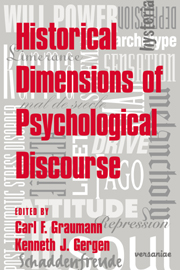Book contents
- Frontmatter
- Contents
- List of contributors
- 1 Psychological discourse in historical context: An introduction
- Part I Disciplining psychological discourse
- Part II History as culture critique
- 6 Power and subjectivity: Critical history and psychology
- 7 Cultural politics by other means: Gender and politics in some American psychologies of emotions
- 8 Principles of selves: The rhetoric of introductory textbooks in American psychology
- Part III Early antecedents
- Part IV Lived history
- Author index
- Subject index
8 - Principles of selves: The rhetoric of introductory textbooks in American psychology
Published online by Cambridge University Press: 20 October 2009
- Frontmatter
- Contents
- List of contributors
- 1 Psychological discourse in historical context: An introduction
- Part I Disciplining psychological discourse
- Part II History as culture critique
- 6 Power and subjectivity: Critical history and psychology
- 7 Cultural politics by other means: Gender and politics in some American psychologies of emotions
- 8 Principles of selves: The rhetoric of introductory textbooks in American psychology
- Part III Early antecedents
- Part IV Lived history
- Author index
- Subject index
Summary
All modern sciences employ textbooks as a pedagogical resource; yet despite the ubiquity of this literary genre, science textbooks hold an ambiguous status. While scientists themselves often denigrate textbooks as containing secondhand or false knowledge, these texts nevertheless are taken to represent knowledge that is at once essential to acquire and superior to ordinary accounts of reality. Given scientists' equivocations regarding textbooks, it is not surprising that historians of science have yet to find a place for textbooks in their reconstructions of scientific activities.
This chapter attempts to situate introductory textbooks within the scientific practices of psychology. In particular, the chapter explores some of the ways in which textbooks have played a part in psychology's ongoing mission to propose and defend a particular construction of social reality – a version of social reality that has enabled or maintained certain cultural practices beyond what are taken as the boundaries of scientific psychology. Put another way, this investigation of one scientific entity, textbooks, proceeds from a conception of science as an organized set of technical practices that engage political, economic, and social conditions, and which transform ordinary understandings of those conditions.
Within this conception, textbooks become all the more interesting because they are created as communications between those members who participate in science and those who do not; textbooks, then, become central resources for transforming everyday, nonscientific versions of the world.
- Type
- Chapter
- Information
- Historical Dimensions of Psychological Discourse , pp. 145 - 162Publisher: Cambridge University PressPrint publication year: 1996
- 7
- Cited by

